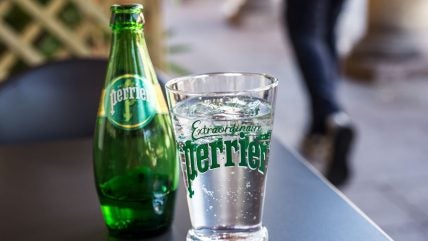
Nestlé has “temporarily suspended” a well in France that supplies its Perrier bottled-water brand following contamination.
The food and drinks giant said it “detected a temporary deviation” after a “period of exceptionally heavy rainfall” at its Vergèze site in the Gard region of southern France.

Discover B2B Marketing That Performs
Combine business intelligence and editorial excellence to reach engaged professionals across 36 leading media platforms.
It has subsequently thrown away “several batches” of Perrier water and a spokesperson told Just Drinks all products delivered to customers and available on-shelf were safe to drink.
Nestlé said it implemented a “strengthened testing protocol” alongside the French authorities following the find.
According to French newspaper Le Monde, the drinks producer found faecal bacteria in the well.
Le Monde, citing French news agency Agence France-Presse (AFP), said local government officials gave Nestlé a formal notice to “immediately suspend” operations at the water site, which has been contaminated since 10 March 2024.

US Tariffs are shifting - will you react or anticipate?
Don’t let policy changes catch you off guard. Stay proactive with real-time data and expert analysis.
By GlobalDataThe Vergèze site is reportedly one of seven water wells Nestlé owns in the area.
It follows questions from France’s safety watchdog last year over the quality of Nestlé’s bottled water. In a statement sent to Just Drinks, the Agency for Food, Environmental and Occupational Health and Safety (ANSES) said its assessment “attests to an insufficient level of confidence” in the quality of the water.
It said doubts were fuelled by “the variability of contamination and the microbiological and chemical vulnerability of these waters”.
Nestlé last month defended its bottled-water safety, saying all of its French natural mineral waters were safe to drink.
Meanwhile, Nestle faces a parliamentary investigation into its treatment of water in the country.
It will look to assess “the practices of bottled water manufacturers and the responsibilities of the state in the failures to control their activities and the management of associated health risks”.
In January, Nestlé admitted to breaching regulations in France over the way it treats bottled mineral water against contamination.
According to Le Monde, Nestlé reportedly used disinfectants “due to sporadic bacterial or chemical contamination”, which are not permitted under French law on products labelled as ‘spring’ or ‘mineral’ water.
In a statement at the time, Nestlé said it used “microfiltration at [its] Waters sites at a finer level than was previously recognised by the French authorities”.
In February, French watchdog organisation Foodwatch filed complaints with a Paris court against Nestlé and Sources Alma for “illegally” treating their bottled mineral water.
The Perrier brand has also faced issues in the US, where in March a man filed a lawsuit centred on allegations the company mislabelled the brand as mineral water.





